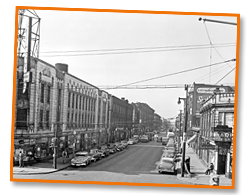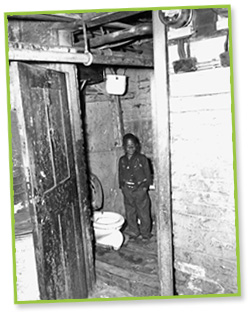Where the Neighborhood Ends
High School: Grades 9–12
Story
Page: 1 | 2 | 3 | 4 | 5 | 6 | 7 | 8 | 9
The next day was Friday, and after school Robert waited for Lane outside the gym. "Let's get a milkshake," Robert invited. They'd always celebrated the end of the week with a double malted at the corner drugstore.
"No thanks, I have plans," Lane answered, wondering how Robert could continue pretending they were friends. "I promised to play cards with some guys. Other guys," he added before Robert could expand the invitation. "See you around." Lane strode home. He stashed his books and gym bag, which now contained his school clothes, in his bedroom. He wrote a note for his mother and slipped it under the vase on the dining table on his way to the kitchen. Then, grabbing a bag of roasted peanuts, he took a cardboard carrier of root beer from the refrigerator. He went back to his desk once again, retrieved a pack of playing cards, and tucked it into the hip pocket of his khaki pants.
Outside, Lane turned his back to the wind blowing off Lake Michigan. As he walked, he surveyed the neighborhoods. Close to the University of Chicago campus, he saw tidy lawns, clean sidewalks, and white faces. Lane's family and one other family were the only blacks living in this section of Hyde Park.
Two blocks farther west, Lane passed a black woman carrying a small child. A few pairs of dark eyes watched him from curtained windows. Most of the young people coming home from school, though, were white. They gave Lane plenty of distance. A freckled man installing a red "For Sale" sign paused to glare at him.
Around the corner, "For Sale" signs lined the street as if they were the newest fad in lawn ornaments. "More of a blight than a fad," Lane thought. "Blockbuster blight."
He knew how the disease spread. First, a real estate agent moved one black family to an all-white block or simply spread a rumor that a black family had arrived. Warning of a "Negro invasion," he urged anxious homeowners to sell quickly before property values plummeted. Then the agent bought dozens of houses at bargain rates and resold them to blacks at exorbitant prices. Banks often denied mortgages to low-income blacks, forcing them to borrow money from predatory lenders. Not surprisingly, many new owners soon lost their homes. Landlords bought the repossessed the houses, converted them into apartments, and crowded them with tenants.
At last Lane reached Cottage Grove Avenue. Five or six years ago, before the blight of greed and racial prejudice struck, this had been a healthy block. Now it lay on the border of the slums. Lane hurried toward the house where his friends Cobie and Esau lived. It had been sliced into apartment units, and all seven members of the twins' family rented the basement. Consequently, Lane was surprised to find a new Lincoln parked along the sidewalk.
Downloads (pdf)


